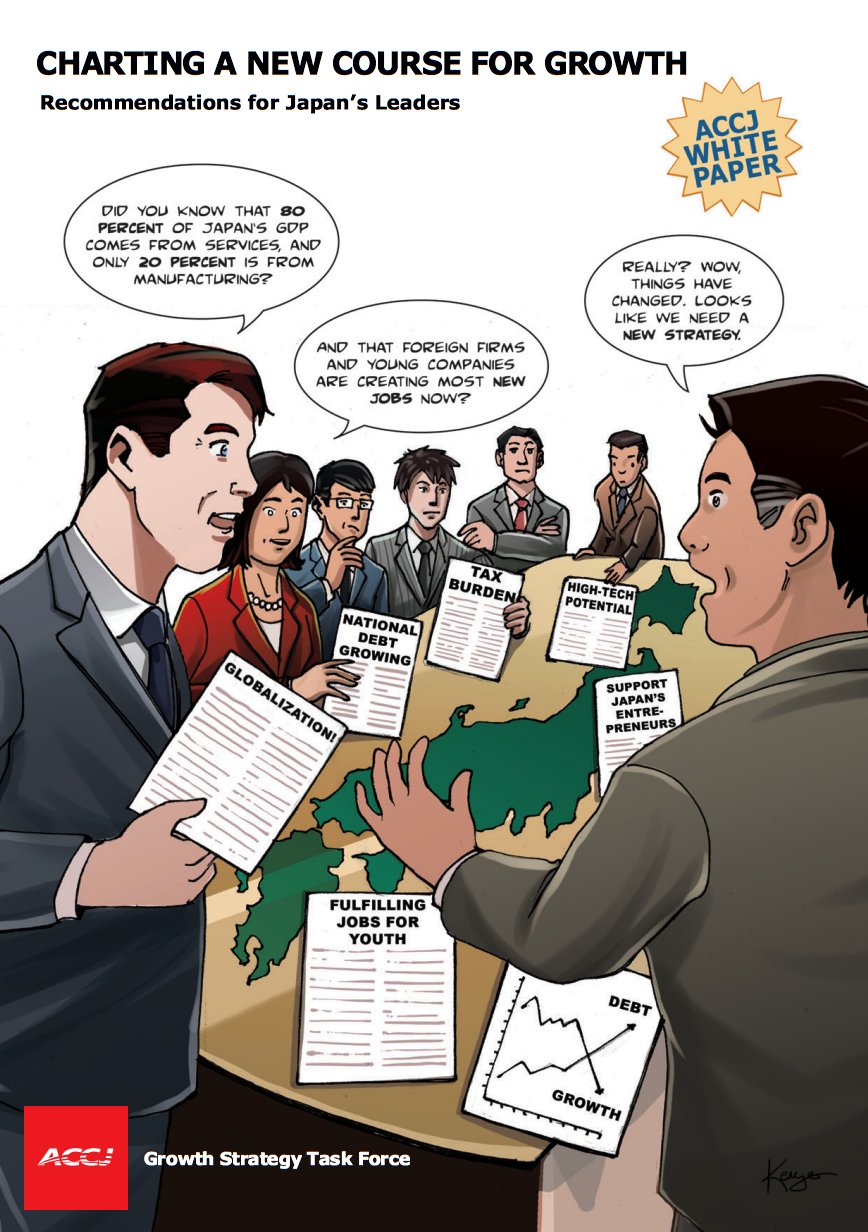
On October 3rd, 2013, I wrote this article in the Asian Wall Street Journal, proposing that Japan promulgate a corporate governance code as part of its growth strategy.
It was the optimal time to do this because earlier in the year the Japanese government had announced its first “Abenomics” growth strategy, which was largely modeled off of the White Paper published by the American Chamber’s “Growth Strategy Task Force“, which I had proposed and led in 2010. This Task Force was far more successful than I ever dreamed it could be. Almost all of the themes in the “third arrow”, including the very concept of a coherent analysis-based growth strategy for Japan, the vital need to enhance productivity growth and economic metabolism, the importance of corporate governance and labor mobility, were identical to the central themes of our ACCJ White Paper; and the LDP even hired the same economist that we had hired, Professor Kyoji Fukao of Hitotsubashi University. (See: “Charting a New Course for Growth: Recommendations for Japan’s Leaders“.)
The report was very widely read, and its concepts seeped into the bedrock of policy-making circles. A book written by Professor Fukao based on the analysis we had commissioned, won the most prestigious prize for an economics book in Japan. In particular, the fact that by 2013 many in the government had come to agree that reigniting productivity growth was essential, and was on track to put in place a “Stewardship Code”, made this the ideal time to propose significant corporate governance reform.
Later that month, I proposed to a senior person at the BOJ and then to key LDP dietmen (mainly Mr. Yasuhisa Shiozaki, who was a leader of the LDP’s growth strategy “Headquarters”) that the LDP create a corporate governance code in order to (a) expand upon (many times over) the comply-or-explain principle that was about to be set forth in the new Company Law in a very limited context; and (b) ensure that the Stewardship Code would have its intended positive impact, by requiring standardized, comparable disclosure about governance practices at each company. I proposed that the new governance code should be drafted by a panel organized by the FSA , the agency that should logically be held accountable for the result because the FSA’s Establishment Law puts it in charge of investor protection, capital markets efficiency, and regulation of the stock exchanges (the listing rules of which are the place where most CG codes principles are reflected). I presented a detailed memo proposal to the dietmen. (Here are the memos that I submitted to Mr. Shiozaki: (1) サマリー 、(2) 予算が要らない、最大に評価される三本目の矢、(3) メモの追記、(4) 諸外国の例。)
I then wrote an article about describing my proposal in the Japanese-language Asahi Journal -法と経済 at the end of January, 2014. This followed upon my October, 2013 article on the same topic in the Wall Street Journal. I later wrote two other articles like this in the same magazine over the following year or so, making detailed recommendations.
Subsequently, I was asked to make a formal presentation of my ideas to the LDP’s growth strategy committee (the Japan Economic Revival Headquarters), and did so on February 7th, 2014. Here is my principal presentation material.
I then advised key LDP members on how to go about creating a code: how to plan for a balanced makeup of the panel, the types of people who should be on it, and general conditions the code should meet. Mr Shiozaki met with the senior official at the FSA and the JPX (Tokyo Stock Exchange) to ask them to consider the concept. Most of my advice was followed simply because it made sense and was based on examples in other countries. Most importantly, the June 2014 growth strategy included my recommendations that the code should follow OECD principles, and should be such that it will be well-regarded by foreign investors;and that there should be a deadline set for the promulgation of the code. (The deadline was set at one year from June 2014.)
In July, I immediately made contact with the FSA person directly in charge of the corporate governance code drafting process and communicated to him: a) my advice on the strategy to follow so as to enable the new code to be as highly regarded as possible abroad, while recognizing certain political realities here; and b) given that strategy, a memo containing the most important provisions that I thought should be in the code in order that it have the greatest possible positive impact on corporate governance in Japan. (Of course, the Code became a reality in June not just because of my input, but thanks to the fine efforts of many others over many years. See below.)
Behind the scenes, until the Code’s finalization, I then “lobbied” and/or supported certain of the members of the council of experts for the Code, and members of the FSA itself, regarding what I considered to be key provisions that should be included.
As you can see, many of my ideas were incorporated into the new governance code, but some important recommendations were not. For example, the new code does not clearly set up a recommended framework for independent committees whereby independent directors can fulfill their full potential, and does not require disclosure of post-retirement compensation paid to former directors (e.g., sodanyaku and komon). Here is a marked version of my original memo to the FSA, showing the items that I think future revisions of the Code should include. There are other items of course; this only shows the items that were not covered at all, or not sufficiently, by the first draft of the Code. I submitted this in July of 2014, and discussed it in detail with Motoyuki Yufu of the FSA.
For the record, none of my advice in any of these forums was done in the name of any organization. I made my recommendations on an entirely personal, individual basis. The Code, of course, came about because of the efforts of many people to improve corporate governance in Japan, over many years. Among many others that would become a much longer list, the work of the following groups and persons should be given great credit: the Secretariat and investor members of the Asian Corporate Governance Association, CG-net, Toshi Oguchi of Governance for Owners, Kazuhiko Toyama of IGPI, Yoshihiko Miyauchi of ORIX, Scott Callon of Ichigo Asset Management, Charles Lake at AFLAC, the Council of Institutional Investors, the ICGN, and the American Chamber of Commerce in Japan. Most of all, the hands-on leaders and policymakers who made it happen, – especially, lead dietman Yasuhisa Shiozaki and Masahiko Shibayama of the LDP, and Motoyuki Yufu of the FSA (and the entire FSA team) – should be highly commended. In addition, as is well known, the Ito report was published in August of 2014.
Nicholas Benes

